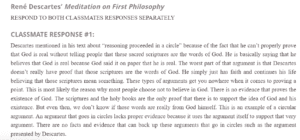Circular Argument
Response to Classmate 1
Hello,
I agree with you; Descartes presents an example of a circular argument. The lack of substantial evidence of God’s existence leaves many people to leave the conversation and settle as infidels. More so, it is uncertain whether these biblical scriptures are words from God. This perspective makes it hard for people to wonder whether God’s existence is a mythical idea or a fact.
Response to Classmate 2
Hello,
I agree with you. Using information without evidence as the core of an argument is tiring. Most non-believers assume biblical scriptures are circumstantial evidence as they cannot prove, without a doubt, that these are God’s words. A claim that ‘goes in circles’ can easily be opposed and concluded as not useful.
ORDER A PLAGIARISM-FREE PAPER HERE
We’ll write everything from scratch
Question
René Descartes’ Meditation on First Philosophy
RESPOND TO BOTH CLASSMATES RESPONSES SEPARATELY

Circular Argument
CLASSMATE RESPONSE #1:
Descartes mentioned in his text about “reasoning proceeded in a circle” because of the fact that he can’t properly prove that God is real without telling people that these sacred scriptures are the words of God. He is basically saying that he believes that God is real because God said it on paper that he is real. The worst part of that argument is that Descartes doesn’t really have proof that those scriptures are the words of God. He simply just has faith and continues his life believing that those scriptures mean something. These types of arguments get you nowhere when it comes to proving a point. This is most likely the reason why most people choose not to believe in God. There is no evidence that proves the existence of God. The scriptures and the holy books are the only proof that there is to support the idea of God and his existence. But even then, we don’t know if those words are really from God himself. This is an example of a circular argument. An argument that goes in circles lacks proper evidence because it uses the argument itself to support that very argument. There are no facts and evidence that can back up these arguments that go in circles such as the argument presented by Descartes.
CLASSMATE RESPONSE #2:
Descartes notices that the people who do not believe in God will not easily be convinced that God exists because of the concept of circular reasoning. Circular reasoning is a type of reasoning in which the proposition is supported by the premises, which is supported by the proposition, creating a circle in reasoning where no useful information is being shared. The argument presented to the non-believers is that, “the existence of God is to be believed since it is taught in the sacred Scriptures, and that, on the other hand, the sacred Scriptures are to be believed because they come from God.” When Descartes calls this argument, “reasoning proceeded in a circle,” what he means is a lackluster argument that is insufficient in information; an argument that uses its claim to equally serve as its evidence. Descartes is critical of a circular argument, because in a way, he believes that we utilize circular reasoning to acknowledge things that we can encounter with our five human senses, but we won’t apply that same concept towards the existence of God. Descartes refers to the Book of Wisdom to support his claim: “…for if their understanding was so great that they could discern the world and the creatures, why did they not rather find out the Lord thereof?” What’s wrong with an argument that “goes in circles” is that it can easily be refuted as it has very little to no evidence at all to support it.

